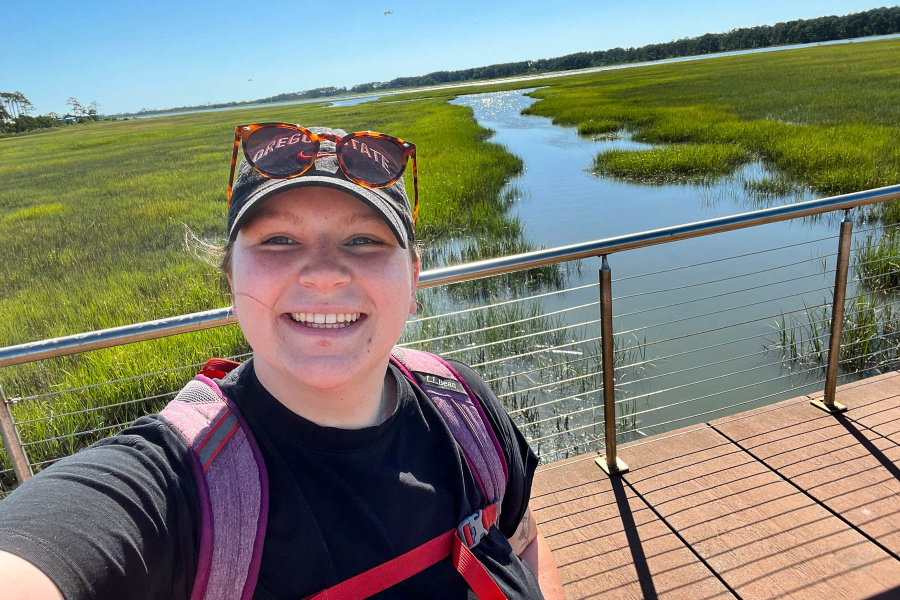My Clean Water Story: Sophie Waterman
Putting people at the center of my clean water career

I was six years old when I found out that oysters could spit. I was with my dad, walking through the salt marshes on Chincoteague Island in Virginia in the early morning. The two of us stopped by one of the exposed reefs and watched the oysters shoot water straight into the air. I didn’t know it then, but one day I would end up working for an organization that protects habitat for oysters and many other critters of the Chesapeake Bay.
Looking back, it was moments like these that ignited my fascination with nature and the environment. I am lucky to have grown up within the Chesapeake Bay watershed, just outside Baltimore in Catonsville, Maryland. My amazing mother homeschooled me and my two sisters, letting us sign up for every class, field trip and camp program we expressed interest in. My favorite of these activities revolved around the outdoors. From kindergarten to 8th grade, I went all over the watershed, from the Appalachian Mountains to the shores of the Chesapeake, learning about the fascinating natural and cultural history of the region.
Geography was another interest of mine as a kid. I took several geography classes and loved everything to do with maps. For Christmas of 2009, I asked for one of those fancy National Geographic atlases, and I stared at those maps for hours and hours. As I grew older and moved on to public high school, my love for the environment and fascination with geography slammed head-on in classes like Human Geography and Environmental Science.
After high school, I had the privilege of studying Geography and Geospatial Science at Oregon State University. Geography is a vast area of study, and there are so many pockets that you can truly dive deep into. My fascination was with humans and the environment, so I took classes where I could study how people are impacted by the land and how they in turn affect the land. It opened my eyes to the importance of being a good steward of our earth, and how if we take care of our home planet, it will take care of us in return.
I was one of the unlucky people to graduate during a pandemic, when many hiring organizations and agencies were in flux, but eventually landed a position with the Chesapeake Research Consortium at the Chesapeake Bay Program. This was a three-year staffer position for the Bay Program’s Maintain Healthy Watershed Goal Implementation Team. The job fit perfectly with my background, since it delt with land use, watershed management and other issues the connect humans and the environment.
At my two-and-a-half-year mark (when most staffers start to seriously apply for other jobs), some geographer positions with the U.S. Geological Survey opened up at the Bay Program. My amazing colleagues encouraged me to apply for one of the positions, and I got it!
I am now a geographer who continues supporting work around the watershed. I get to think about questions related to protecting the watershed and support the creation of tools and maps to help local communities address their needs while helping the Bay Program reach its goals.
While my clean water story starts with spitting oysters, at the center of it are people: people who have encouraged me to pursue my interests and examine how they intersect, people who are doing the work to help ensure our water is healthy, and the people who make up this region and who have deep connections to the Chesapeake.
People are why I want to be a part of this work. Ensuring we have a healthy watershed also ensures that people have access to things like clean water, healthy fish and access to beautiful and prosperous land.

Comments
Wonderfully wrote!
Congratulations on your chosen career path Sophie! I worked for EPA for 28 year-end came to the Agency from the Hill. My last several years were in the Office of Water and I worked closely with the CBPO. I'm now fortunate to live on the Bay and am very grateful to those who are carrying the work forward. As population grows and the planet warms Bay restoration and protection will be more challenging. I was fortunate to see real progress during and sense the early 1970s. I hope you will look back in a few decades and be able to see progress as well!
Thank you!
Your comment has been received. Before it can be published, the comment will be reviewed by our team to ensure it adheres with our rules of engagement.
Back to recent stories